北师大版高中英语必修一Unit 1 Lifestyles 03现在时和将来时
文档属性
| 名称 | 北师大版高中英语必修一Unit 1 Lifestyles 03现在时和将来时 | 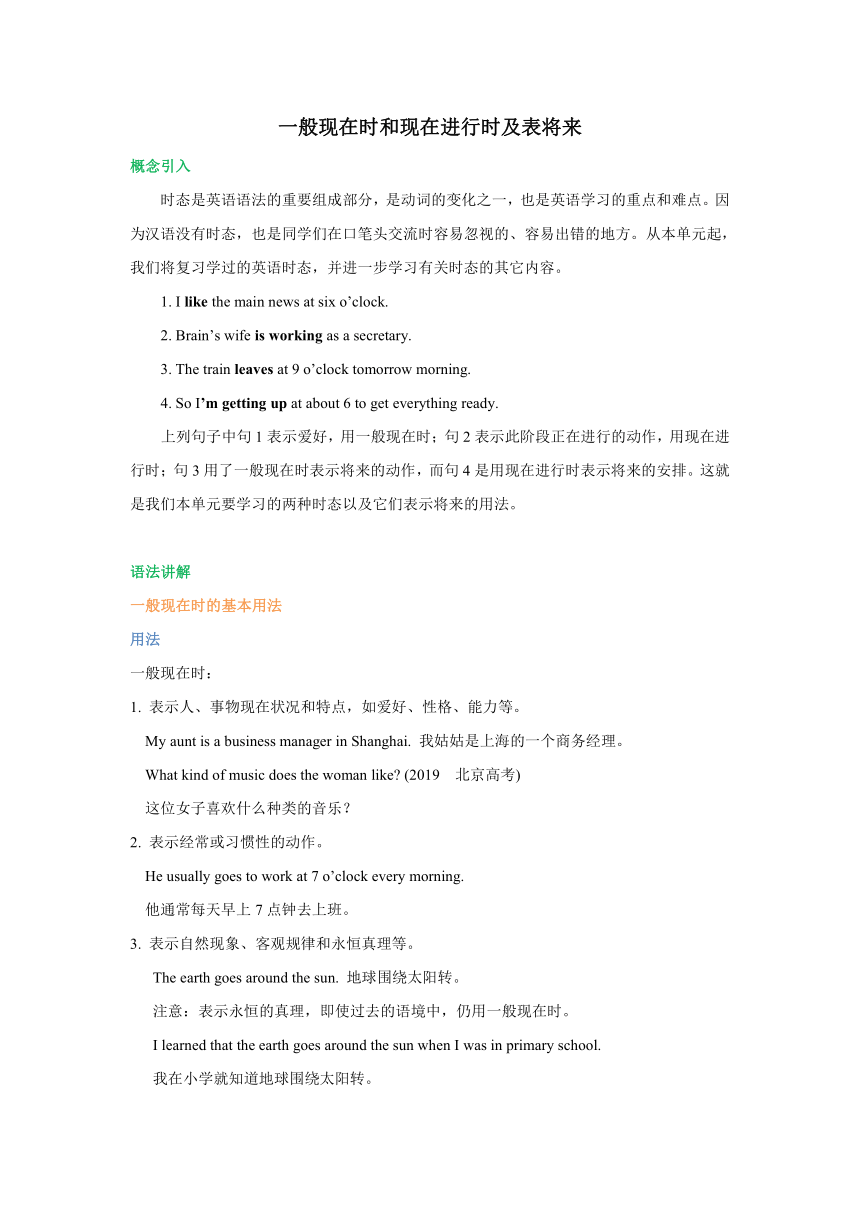 | |
| 格式 | zip | ||
| 文件大小 | 33.2KB | ||
| 资源类型 | 教案 | ||
| 版本资源 | 北师大版 | ||
| 科目 | 英语 | ||
| 更新时间 | 2019-11-05 20:07:06 | ||
图片预览

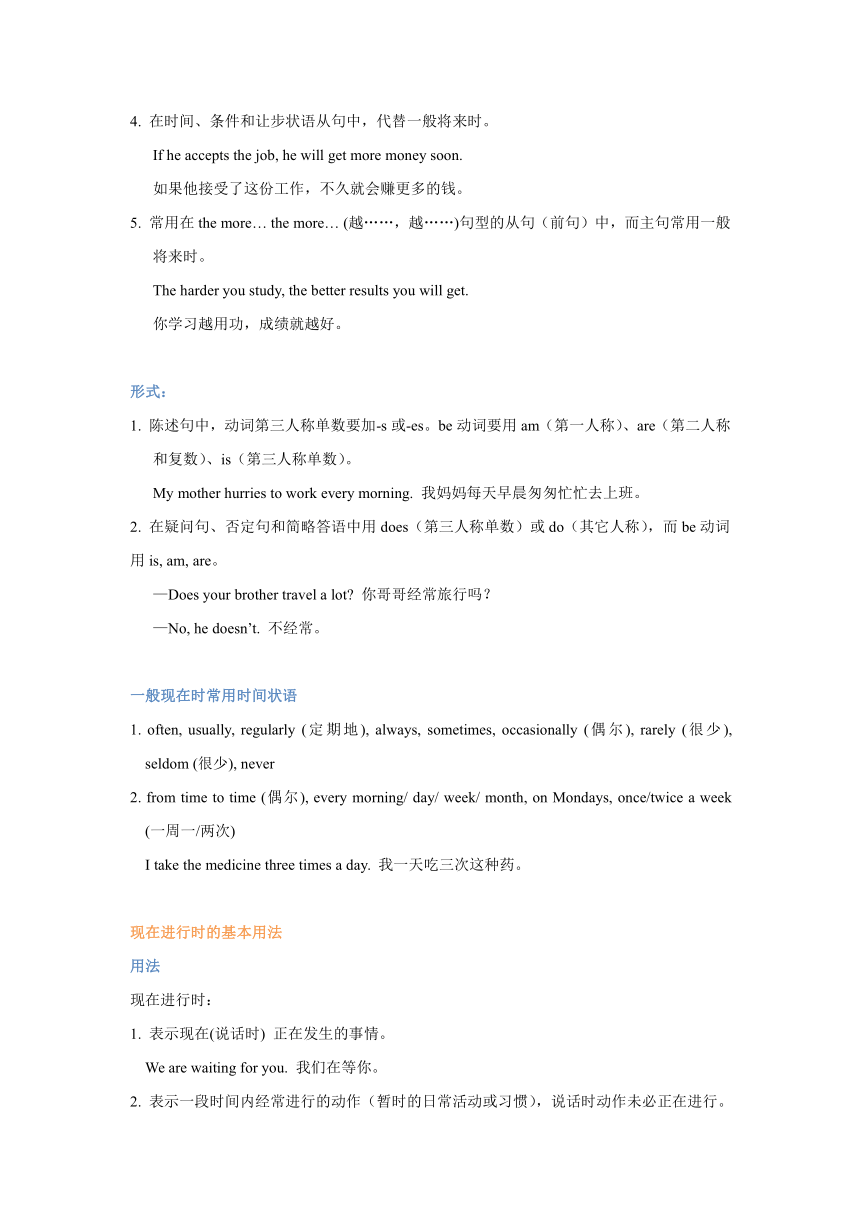
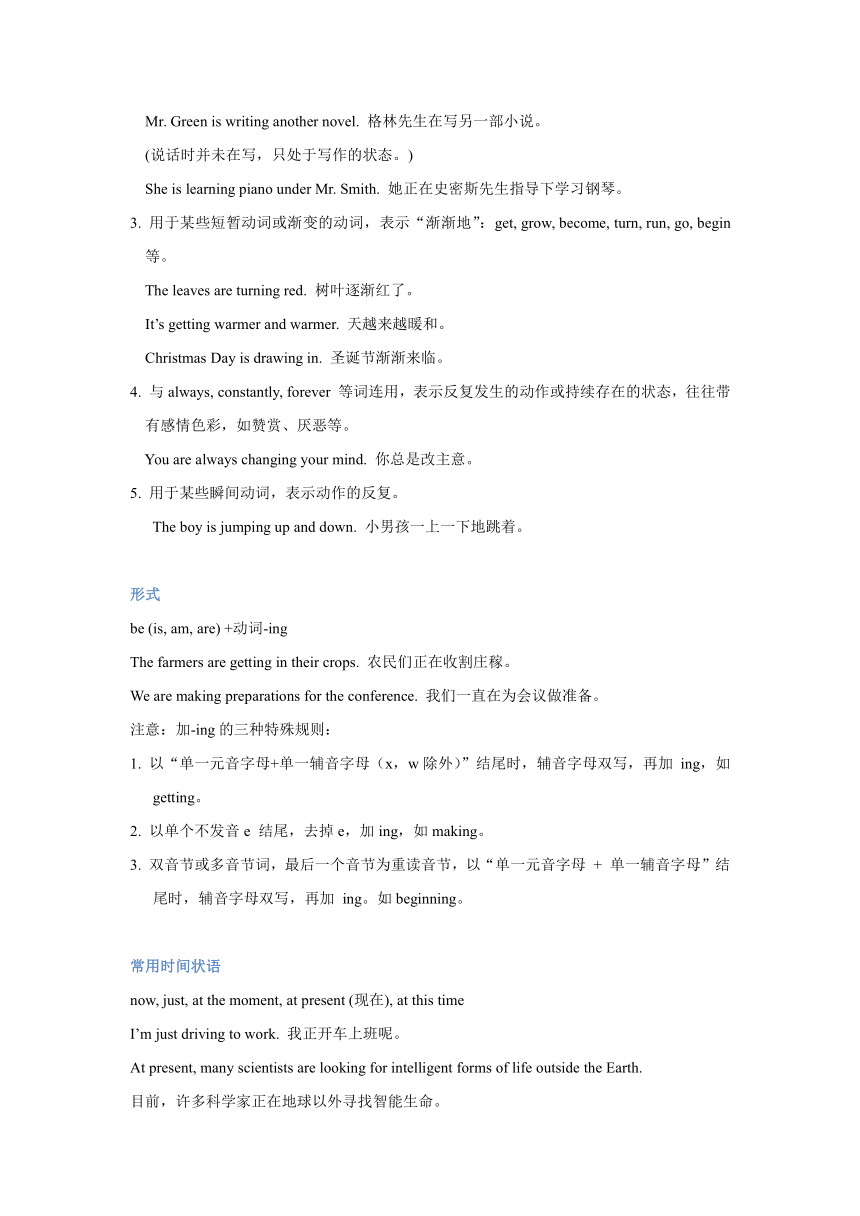
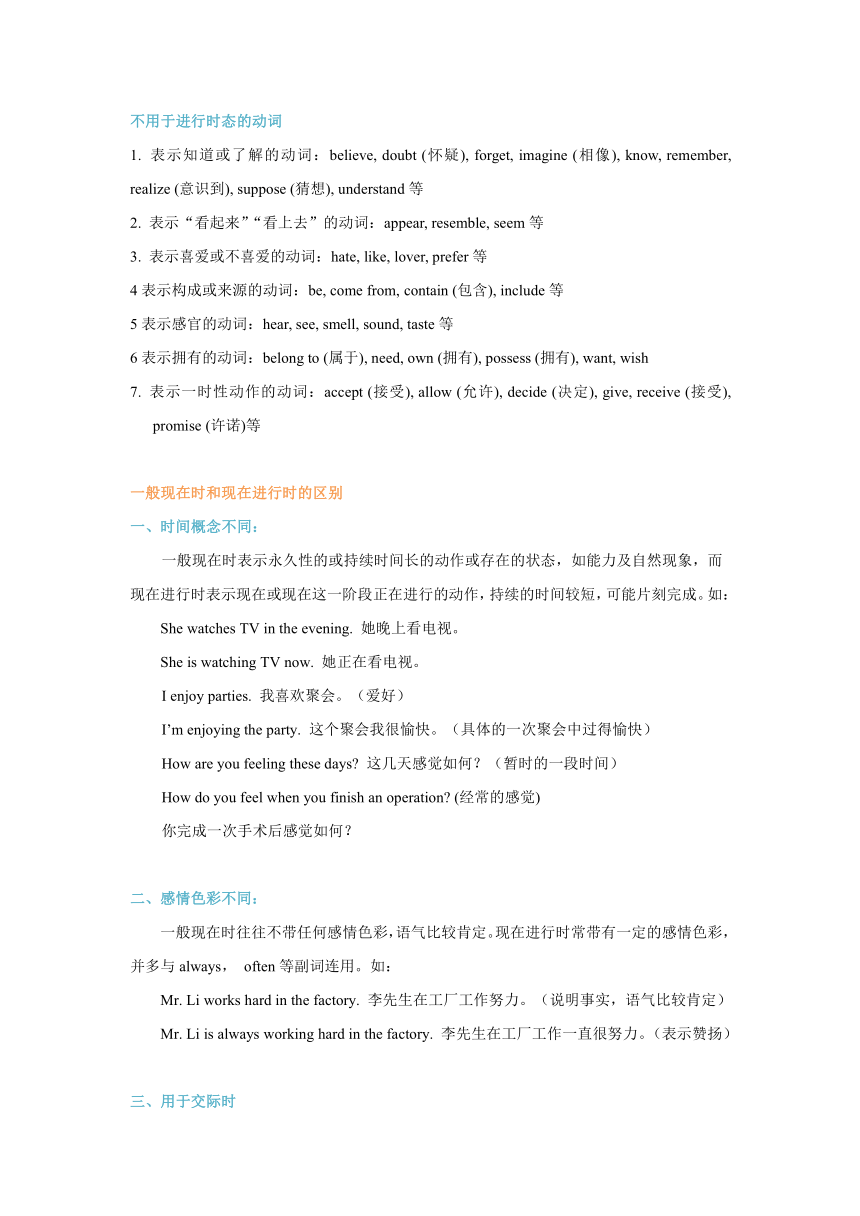
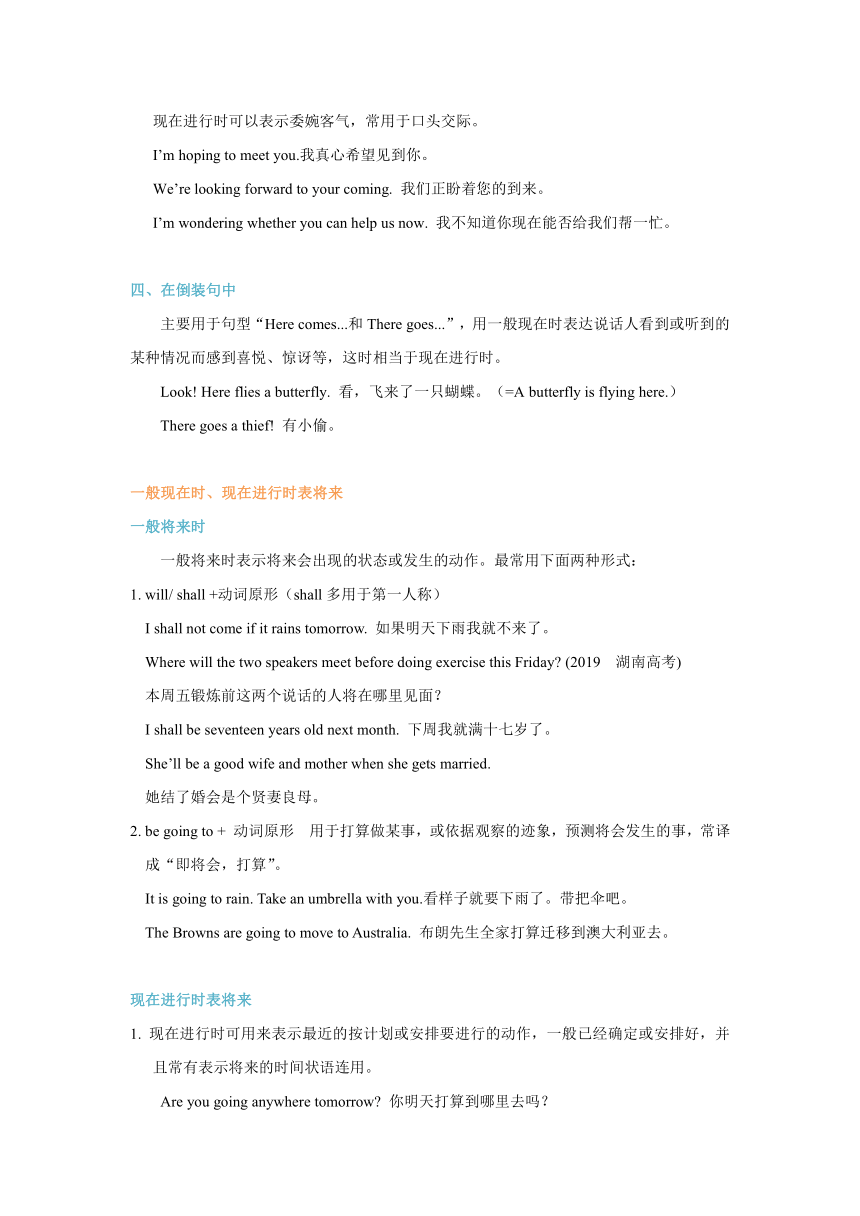
文档简介
一般现在时和现在进行时及表将来
概念引入
时态是英语语法的重要组成部分,是动词的变化之一,也是英语学习的重点和难点。因为汉语没有时态,也是同学们在口笔头交流时容易忽视的、容易出错的地方。从本单元起,我们将复习学过的英语时态,并进一步学习有关时态的其它内容。
1. I like the main news at six o’clock.
2. Brain’s wife is working as a secretary.
3. The train leaves at 9 o’clock tomorrow morning.
4. So I’m getting up at about 6 to get everything ready.
上列句子中句1表示爱好,用一般现在时;句2表示此阶段正在进行的动作,用现在进行时;句3用了一般现在时表示将来的动作,而句4是用现在进行时表示将来的安排。这就是我们本单元要学习的两种时态以及它们表示将来的用法。
语法讲解
一般现在时的基本用法
用法
一般现在时:
1. 表示人、事物现在状况和特点,如爱好、性格、能力等。
My aunt is a business manager in Shanghai. 我姑姑是上海的一个商务经理。
What kind of music does the woman like? (2019 北京高考)
这位女子喜欢什么种类的音乐?
2. 表示经常或习惯性的动作。
He usually goes to work at 7 o’clock every morning.
他通常每天早上7点钟去上班。
3. 表示自然现象、客观规律和永恒真理等。
The earth goes around the sun. 地球围绕太阳转。
注意:表示永恒的真理,即使过去的语境中,仍用一般现在时。
I learned that the earth goes around the sun when I was in primary school.
我在小学就知道地球围绕太阳转。
4. 在时间、条件和让步状语从句中,代替一般将来时。
If he accepts the job, he will get more money soon.
如果他接受了这份工作,不久就会赚更多的钱。
5. 常用在the more… the more… (越……,越……)句型的从句(前句)中,而主句常用一般将来时。
The harder you study, the better results you will get.
你学习越用功,成绩就越好。
形式:
1. 陈述句中,动词第三人称单数要加-s或-es。be动词要用am(第一人称)、are(第二人称和复数)、is(第三人称单数)。
My mother hurries to work every morning. 我妈妈每天早晨匆匆忙忙去上班。
2. 在疑问句、否定句和简略答语中用does(第三人称单数)或do(其它人称),而be动词用is, am, are。
—Does your brother travel a lot? 你哥哥经常旅行吗?
—No, he doesn’t. 不经常。
一般现在时常用时间状语
1. often, usually, regularly (定期地), always, sometimes, occasionally (偶尔), rarely (很少), seldom (很少), never
2. from time to time (偶尔), every morning/ day/ week/ month, on Mondays, once/twice a week (一周一/两次)
I take the medicine three times a day. 我一天吃三次这种药。
现在进行时的基本用法
用法
现在进行时:
1. 表示现在(说话时) 正在发生的事情。
We are waiting for you. 我们在等你。
2. 表示一段时间内经常进行的动作(暂时的日常活动或习惯),说话时动作未必正在进行。
Mr. Green is writing another novel. 格林先生在写另一部小说。
(说话时并未在写,只处于写作的状态。)
She is learning piano under Mr. Smith. 她正在史密斯先生指导下学习钢琴。
3. 用于某些短暂动词或渐变的动词,表示“渐渐地”:get, grow, become, turn, run, go, begin等。
The leaves are turning red. 树叶逐渐红了。
It’s getting warmer and warmer. 天越来越暖和。
Christmas Day is drawing in. 圣诞节渐渐来临。
4. 与always, constantly, forever 等词连用,表示反复发生的动作或持续存在的状态,往往带有感彩,如赞赏、厌恶等。
You are always changing your mind. 你总是改主意。
5. 用于某些瞬间动词,表示动作的反复。
The boy is jumping up and down. 小男孩一上一下地跳着。
形式
be (is, am, are) +动词-ing
The farmers are getting in their crops. 农民们正在收割庄稼。
We are making preparations for the conference. 我们一直在为会议做准备。
注意:加-ing的三种特殊规则:
1. 以“单一元音字母+单一辅音字母(x,w除外)”结尾时,辅音字母双写,再加 ing,如getting。
2. 以单个不发音e 结尾,去掉e,加ing,如making。
3. 双音节或多音节词,最后一个音节为重读音节,以“单一元音字母 + 单一辅音字母”结尾时,辅音字母双写,再加 ing。如beginning。
常用时间状语
now, just, at the moment, at present (现在), at this time
I’m just driving to work. 我正开车上班呢。
At present, many scientists are looking for intelligent forms of life outside the Earth.
目前,许多科学家正在地球以外寻找智能生命。
不用于进行时态的动词
1. 表示知道或了解的动词:believe, doubt (怀疑), forget, imagine (相像), know, remember, realize (意识到), suppose (猜想), understand等
2. 表示“看起来”“看上去”的动词:appear, resemble, seem等
3. 表示喜爱或不喜爱的动词:hate, like, lover, prefer等
4表示构成或来源的动词:be, come from, contain (包含), include等
5表示感官的动词:hear, see, smell, sound, taste等
6表示拥有的动词:belong to (属于), need, own (拥有), possess (拥有), want, wish
7. 表示一时性动作的动词:accept (接受), allow (允许), decide (决定), give, receive (接受), promise (许诺)等
一般现在时和现在进行时的区别
一、时间概念不同:
一般现在时表示永久性的或持续时间长的动作或存在的状态,如能力及自然现象,而现在进行时表示现在或现在这一阶段正在进行的动作,持续的时间较短,可能片刻完成。如: She watches TV in the evening. 她晚上看电视。 She is watching TV now. 她正在看电视。
I enjoy parties. 我喜欢聚会。(爱好)
I’m enjoying the party. 这个聚会我很愉快。(具体的一次聚会中过得愉快)
How are you feeling these days? 这几天感觉如何?(暂时的一段时间)
How do you feel when you finish an operation? (经常的感觉)
你完成一次手术后感觉如何?
二、感彩不同: 一般现在时往往不带任何感彩,语气比较肯定。现在进行时常带有一定的感彩,并多与always, often等副词连用。如: Mr. Li works hard in the factory. 李先生在工厂工作努力。(说明事实,语气比较肯定) Mr. Li is always working hard in the factory. 李先生在工厂工作一直很努力。(表示赞扬)
三、用于交际时
现在进行时可以表示委婉客气,常用于口头交际。
I’m hoping to meet you.我真心希望见到你。
We’re looking forward to your coming. 我们正盼着您的到来。
I’m wondering whether you can help us now. 我不知道你现在能否给我们帮一忙。
四、在倒装句中
主要用于句型“Here comes...和There goes...”,用一般现在时表达说话人看到或听到的某种情况而感到喜悦、惊讶等,这时相当于现在进行时。
Look! Here flies a butterfly. 看,飞来了一只蝴蝶。(=A butterfly is flying here.)
There goes a thief! 有小偷。
一般现在时、现在进行时表将来
一般将来时
一般将来时表示将来会出现的状态或发生的动作。最常用下面两种形式:
1. will/ shall +动词原形(shall多用于第一人称)
I shall not come if it rains tomorrow. 如果明天下雨我就不来了。
Where will the two speakers meet before doing exercise this Friday? (2019 湖南高考)
本周五锻炼前这两个说话的人将在哪里见面?
I shall be seventeen years old next month. 下周我就满十七岁了。
She’ll be a good wife and mother when she gets married.
她结了婚会是个贤妻良母。
2. be going to + 动词原形 用于打算做某事,或依据观察的迹象,预测将会发生的事,常译成“即将会,打算”。
It is going to rain. Take an umbrella with you.看样子就要下雨了。带把伞吧。
The Browns are going to move to Australia. 布朗先生全家打算迁移到澳大利亚去。
现在进行时表将来
1. 现在进行时可用来表示最近的按计划或安排要进行的动作,一般已经确定或安排好,并且常有表示将来的时间状语连用。
Are you going anywhere tomorrow? 你明天打算到哪里去吗?
A foreign guest is giving a lecture in English this afternoon.
今天下午一个外宾要做一个英语的演讲。
We are staying here until the end of the month. 我们打算住到这个月末。
注意:这种用法多用于下面少数动词,如go,come,leave,start,arrive,return,work,sleep,stay,play,do,have,wear等。
2. 现在进行时可以用于某些瞬间动词表示马上要发生的动作。
The report is ending. Just be patient. 报告快要结束了,耐心点。
The old man is dying. 老头病危了。
一般现在时表将来 1. 表示按时间表拟定的或事先安排好的事情或要发生的动作。
The train leaves at six tomorrow morning. 这列火车明天六点开车。
The football match takes place next Monday. 那场足球赛将与下周一举行。 2. 在时间或条件句中。 When Bill comes, ask him to wait for me. 比尔来时,让他等我。
If you speak slowly, I’ll understand you. 你要是慢点讲,我会听得懂的。
3 在表祈愿的动词hope, wish,take care that, make sure that等后。 I hope they have a nice time next week. 我希望他们下周愉快。 Make sure that the windows are closed before you leave the room.
你离开前,要确认窗户都关上了。
表达将来的三个易混形式区别(以do为例)
do/ does
时间表排定的事
be doing
个人具体安排
be going to do
意图,打算
I’m meeting my friend at the air- port tomorrow. 我明天要在机场见一个朋友。
Her plane arrives at 11 a.m. 她的飞机11点到达。
We are going to have lunch together. 我们打算一起吃午饭。
巩固练习
一、用括号里所给的词的正确形式填空。
Mom told me that the summer _______ (come) after the spring.
The match between Guo’an and Xin’an ______________ (begin) at 5 tomorrow. Would you like to watch it with me?
Look! The bridge __________________ (repair), so we can’t choose this road to save time.
Grandpa _______always_______________ (tell) the same story to me, but I am familiar with it already!
Ladies and gentlemen, please fasten your belt, our plane _____________ (take) off.
The summer term ______________ (begin) on the 1st of September.
My cousin from America _____________ (come) next week.
I _________________________ (study) medicine after school.
We ________________ (train) every day this week to prepare for our next match.
I __________________ (get) married in October.
二、单项选择
1. (2019 北京西城期中)On Monday mornings my father usually _______ an hour driving me to school although the distance is only 20 miles.
A. spends B. is spending C. spent D. will spend
2. (2019 重庆高考) You’d better write down her phone number before you ______ it.
A. forget B. are forgetting C. forgot D. will forget
3. (2019 安徽蚌埠五中期中) Hurry up! The train _______. You know it _______ at 8:30 am.
A.leaves; leaves B.is leaving; leaves C.leaves; is leaving D.is leaving; is leaving
4. Most students don’t like Tom,because he ______ always ________.
A.is;lying B.do;lie C.is;lie D.does;lying
5. He will have learned English for eight years by the time he ______ from the university next year.
A.will graduate B.will have graduated C.graduates D.is to graduate
6.—Could you please tell us about the culture of China right now?
—All right. I ________ to that.
A.come B.have come C.am coming D.came
7. Mr. Smith as well as two of his students ________ the experiment with care at the moment.
A.is doing B.are doing C.does D.do
8. Over the years the famous actor _______ with a number of directors.
A. worked B. work C. has worked D. is working
9. —Can I help you, sir?
—Yes. I bought this radio yesterday, but it ____.
A. didn’t work B. won’t work C. can’t work D. doesn’t work
10. Do I have to take this medicine? It _____ so terrible.
A. tastes B. is tasting C. is tasted D. has tasted
11. John, together with three friends, _______ a visit to the Great Wall this summer.
A. are going to pay B. is going to pay C. pays D. pay
12. — Mary wants to know if you _______ a picnic this Saturday.
— Yes, but if it _______, I’ll watch a movie instead.
A. have; will rain B. will have; rains C. will have; will rain D. have; rains
13. —Tomorrow ____ my birthday. I’d like you and Jane to come.
—I’m not sure if she ____ free.
A.will be; is B.is going to; is C.is; is D.is; will be
14. I think it necessary for my 19-year-old son to have his own mobile phone, for I sometimes want to know if he _____ home for dinner.
A. come B. comes C. has come D. will come
15. I ______ pingpong quite well, but I haven’t had time to play since the new year.
A. will play B. have played C. played D. play
三、完成句子
1. 下星期天你要干什么? (do)
What ________________ next Sunday?
2. 快点!老师们马上就到了。(arrive)
Be quick! The teachers ________ soon.
3. 他在写一本有关乡村音乐的书。(write)
He ____________a book on country music.
4. 不要担心,我现在就去问问有关事故的情况。(ask)
Don’t worry. I _____________ the accident.
5. 我的朋友总是先为别人着想。(think)
My friend ___________ others first.
6. 你看到他时,告诉他来我这里。(meet)
____________him, tell him to come to my place.
7. 看这幅图,那些孩子正在公园里放风筝。(fly)
Look at the picture. The children ___________ in the park.
8. 小汤姆总哭,他妈妈很生气。(cry)
Little Tom _________ all the time, which makes his mother angry.
9. 穿上大衣!我带你下楼看医生去。(take)
Put on your coat! I __________ you to see the doctor downstairs.
10. 不要吵闹,爸爸正在听新闻。(listen)
Don’t make noises. Father ________ to the news.
答案与解析
一、用括号里所给的词的正确形式填空。
1. comes 2. begins 3. is being repaired 4. is... telling 5. is taking
6. begins 7. is coming 8. study 9. are being trained 10. am getting
提示:is/ am/ are +being done 是现在进行时的被动语态。
二、单项选择
1. A。因为是周一早晨经常做的动作,应该用一般现在时,my father是单数第三人称,所以选A。
2. A。在时间状语从句和条件状语从句中,常使用一般现在时代替一般将来时。before引导的是时间状语从句,所以用一般现在时。句意:在你忘记之前最好把他的电话号码写下来。故选A。
3. B。第一空:火车要开了,因为火车开车是近期按时间安排进行的,所以用现在进行时表示将来;第二空火车的开车严格按时间表安排的动作常用一般现在时表示。所以选B。
4. A。现在进行时和always连用,表示不满或批评的感彩。
5. C。by the time引导时间状语从句,要用一般现在时代替将来时。A项与D项都表示将来时;B项是将来完成时,均不符合本题条件。故选C。
6. C。答句句意为“好的,我就要讲到这一内容。”用进行时表将来。
7. A。句意:史密斯先生和他的两个学生此刻正在认真地做实验。as well as“和;也”,此处连接两个并列主语,谓语动词的数应与前面的主语Mr. Smith 保持一致。根据时间状语at the moment可知应用现在进行时,故A项正确。
8. C。over the years意思是“这些年来”,指从过去某时到现在,多与现在完成时连用,所以选C。句意:这些年来,这位著名演员与好几个导演合作过。
9. D。根据回答的人所说的可知,他昨天买的收音机,现在不工作了,所以来找店家交涉。如果昨天不工作,他就不会买了;这里指收音机不响了这个事实,不涉及它是否有这个能力,所以不能选C。故选D。
10. A。taste是系动词,表示“尝起来”,表示药的特点:尝起来难吃,用一般现在时,不用现在进行时,也没有被动语态,所以选A。
11. B。主语后虽然有together with短语作插入语,但是谓语动词的人称和数根据主语决定,此题选单数;“今年夏天”要去或者去过(如冬天或秋天谈论时),选项中没有过去时,应用将来时,故选B。
12. B。上句中if引导的是宾语从句,意为“是否”,可以用一般将来时;而下句的if是“如果”的意思,用一般现在时表示将来。所以选B。
13.D 第一空是表示“客观事实”,用一般现在时,因为不是计划安排,也不是有迹象的推测,要用will;第二空是表示“将来的状态”,用一般将来时。
14. D。此句中if从句不是条件状语从句,而是make sure的宾语从句,所以根据句意可知,应用一般将来时。句意:我认为我19岁的儿子有必要有个手机了,因为有时我想知道他是否会回家吃饭。
15. D。“乒乓球打得好”是能力,是长时间的,应用一般现在时,所以选D。
三、完成句子
1. are you doing/going to do 2. are arriving
3. is writing 4. will go and ask about
5. is always thinking of 6. When you meet
7. are flying kites 8. is always crying
9. am taking/ will take 10. is listening
概念引入
时态是英语语法的重要组成部分,是动词的变化之一,也是英语学习的重点和难点。因为汉语没有时态,也是同学们在口笔头交流时容易忽视的、容易出错的地方。从本单元起,我们将复习学过的英语时态,并进一步学习有关时态的其它内容。
1. I like the main news at six o’clock.
2. Brain’s wife is working as a secretary.
3. The train leaves at 9 o’clock tomorrow morning.
4. So I’m getting up at about 6 to get everything ready.
上列句子中句1表示爱好,用一般现在时;句2表示此阶段正在进行的动作,用现在进行时;句3用了一般现在时表示将来的动作,而句4是用现在进行时表示将来的安排。这就是我们本单元要学习的两种时态以及它们表示将来的用法。
语法讲解
一般现在时的基本用法
用法
一般现在时:
1. 表示人、事物现在状况和特点,如爱好、性格、能力等。
My aunt is a business manager in Shanghai. 我姑姑是上海的一个商务经理。
What kind of music does the woman like? (2019 北京高考)
这位女子喜欢什么种类的音乐?
2. 表示经常或习惯性的动作。
He usually goes to work at 7 o’clock every morning.
他通常每天早上7点钟去上班。
3. 表示自然现象、客观规律和永恒真理等。
The earth goes around the sun. 地球围绕太阳转。
注意:表示永恒的真理,即使过去的语境中,仍用一般现在时。
I learned that the earth goes around the sun when I was in primary school.
我在小学就知道地球围绕太阳转。
4. 在时间、条件和让步状语从句中,代替一般将来时。
If he accepts the job, he will get more money soon.
如果他接受了这份工作,不久就会赚更多的钱。
5. 常用在the more… the more… (越……,越……)句型的从句(前句)中,而主句常用一般将来时。
The harder you study, the better results you will get.
你学习越用功,成绩就越好。
形式:
1. 陈述句中,动词第三人称单数要加-s或-es。be动词要用am(第一人称)、are(第二人称和复数)、is(第三人称单数)。
My mother hurries to work every morning. 我妈妈每天早晨匆匆忙忙去上班。
2. 在疑问句、否定句和简略答语中用does(第三人称单数)或do(其它人称),而be动词用is, am, are。
—Does your brother travel a lot? 你哥哥经常旅行吗?
—No, he doesn’t. 不经常。
一般现在时常用时间状语
1. often, usually, regularly (定期地), always, sometimes, occasionally (偶尔), rarely (很少), seldom (很少), never
2. from time to time (偶尔), every morning/ day/ week/ month, on Mondays, once/twice a week (一周一/两次)
I take the medicine three times a day. 我一天吃三次这种药。
现在进行时的基本用法
用法
现在进行时:
1. 表示现在(说话时) 正在发生的事情。
We are waiting for you. 我们在等你。
2. 表示一段时间内经常进行的动作(暂时的日常活动或习惯),说话时动作未必正在进行。
Mr. Green is writing another novel. 格林先生在写另一部小说。
(说话时并未在写,只处于写作的状态。)
She is learning piano under Mr. Smith. 她正在史密斯先生指导下学习钢琴。
3. 用于某些短暂动词或渐变的动词,表示“渐渐地”:get, grow, become, turn, run, go, begin等。
The leaves are turning red. 树叶逐渐红了。
It’s getting warmer and warmer. 天越来越暖和。
Christmas Day is drawing in. 圣诞节渐渐来临。
4. 与always, constantly, forever 等词连用,表示反复发生的动作或持续存在的状态,往往带有感彩,如赞赏、厌恶等。
You are always changing your mind. 你总是改主意。
5. 用于某些瞬间动词,表示动作的反复。
The boy is jumping up and down. 小男孩一上一下地跳着。
形式
be (is, am, are) +动词-ing
The farmers are getting in their crops. 农民们正在收割庄稼。
We are making preparations for the conference. 我们一直在为会议做准备。
注意:加-ing的三种特殊规则:
1. 以“单一元音字母+单一辅音字母(x,w除外)”结尾时,辅音字母双写,再加 ing,如getting。
2. 以单个不发音e 结尾,去掉e,加ing,如making。
3. 双音节或多音节词,最后一个音节为重读音节,以“单一元音字母 + 单一辅音字母”结尾时,辅音字母双写,再加 ing。如beginning。
常用时间状语
now, just, at the moment, at present (现在), at this time
I’m just driving to work. 我正开车上班呢。
At present, many scientists are looking for intelligent forms of life outside the Earth.
目前,许多科学家正在地球以外寻找智能生命。
不用于进行时态的动词
1. 表示知道或了解的动词:believe, doubt (怀疑), forget, imagine (相像), know, remember, realize (意识到), suppose (猜想), understand等
2. 表示“看起来”“看上去”的动词:appear, resemble, seem等
3. 表示喜爱或不喜爱的动词:hate, like, lover, prefer等
4表示构成或来源的动词:be, come from, contain (包含), include等
5表示感官的动词:hear, see, smell, sound, taste等
6表示拥有的动词:belong to (属于), need, own (拥有), possess (拥有), want, wish
7. 表示一时性动作的动词:accept (接受), allow (允许), decide (决定), give, receive (接受), promise (许诺)等
一般现在时和现在进行时的区别
一、时间概念不同:
一般现在时表示永久性的或持续时间长的动作或存在的状态,如能力及自然现象,而现在进行时表示现在或现在这一阶段正在进行的动作,持续的时间较短,可能片刻完成。如: She watches TV in the evening. 她晚上看电视。 She is watching TV now. 她正在看电视。
I enjoy parties. 我喜欢聚会。(爱好)
I’m enjoying the party. 这个聚会我很愉快。(具体的一次聚会中过得愉快)
How are you feeling these days? 这几天感觉如何?(暂时的一段时间)
How do you feel when you finish an operation? (经常的感觉)
你完成一次手术后感觉如何?
二、感彩不同: 一般现在时往往不带任何感彩,语气比较肯定。现在进行时常带有一定的感彩,并多与always, often等副词连用。如: Mr. Li works hard in the factory. 李先生在工厂工作努力。(说明事实,语气比较肯定) Mr. Li is always working hard in the factory. 李先生在工厂工作一直很努力。(表示赞扬)
三、用于交际时
现在进行时可以表示委婉客气,常用于口头交际。
I’m hoping to meet you.我真心希望见到你。
We’re looking forward to your coming. 我们正盼着您的到来。
I’m wondering whether you can help us now. 我不知道你现在能否给我们帮一忙。
四、在倒装句中
主要用于句型“Here comes...和There goes...”,用一般现在时表达说话人看到或听到的某种情况而感到喜悦、惊讶等,这时相当于现在进行时。
Look! Here flies a butterfly. 看,飞来了一只蝴蝶。(=A butterfly is flying here.)
There goes a thief! 有小偷。
一般现在时、现在进行时表将来
一般将来时
一般将来时表示将来会出现的状态或发生的动作。最常用下面两种形式:
1. will/ shall +动词原形(shall多用于第一人称)
I shall not come if it rains tomorrow. 如果明天下雨我就不来了。
Where will the two speakers meet before doing exercise this Friday? (2019 湖南高考)
本周五锻炼前这两个说话的人将在哪里见面?
I shall be seventeen years old next month. 下周我就满十七岁了。
She’ll be a good wife and mother when she gets married.
她结了婚会是个贤妻良母。
2. be going to + 动词原形 用于打算做某事,或依据观察的迹象,预测将会发生的事,常译成“即将会,打算”。
It is going to rain. Take an umbrella with you.看样子就要下雨了。带把伞吧。
The Browns are going to move to Australia. 布朗先生全家打算迁移到澳大利亚去。
现在进行时表将来
1. 现在进行时可用来表示最近的按计划或安排要进行的动作,一般已经确定或安排好,并且常有表示将来的时间状语连用。
Are you going anywhere tomorrow? 你明天打算到哪里去吗?
A foreign guest is giving a lecture in English this afternoon.
今天下午一个外宾要做一个英语的演讲。
We are staying here until the end of the month. 我们打算住到这个月末。
注意:这种用法多用于下面少数动词,如go,come,leave,start,arrive,return,work,sleep,stay,play,do,have,wear等。
2. 现在进行时可以用于某些瞬间动词表示马上要发生的动作。
The report is ending. Just be patient. 报告快要结束了,耐心点。
The old man is dying. 老头病危了。
一般现在时表将来 1. 表示按时间表拟定的或事先安排好的事情或要发生的动作。
The train leaves at six tomorrow morning. 这列火车明天六点开车。
The football match takes place next Monday. 那场足球赛将与下周一举行。 2. 在时间或条件句中。 When Bill comes, ask him to wait for me. 比尔来时,让他等我。
If you speak slowly, I’ll understand you. 你要是慢点讲,我会听得懂的。
3 在表祈愿的动词hope, wish,take care that, make sure that等后。 I hope they have a nice time next week. 我希望他们下周愉快。 Make sure that the windows are closed before you leave the room.
你离开前,要确认窗户都关上了。
表达将来的三个易混形式区别(以do为例)
do/ does
时间表排定的事
be doing
个人具体安排
be going to do
意图,打算
I’m meeting my friend at the air- port tomorrow. 我明天要在机场见一个朋友。
Her plane arrives at 11 a.m. 她的飞机11点到达。
We are going to have lunch together. 我们打算一起吃午饭。
巩固练习
一、用括号里所给的词的正确形式填空。
Mom told me that the summer _______ (come) after the spring.
The match between Guo’an and Xin’an ______________ (begin) at 5 tomorrow. Would you like to watch it with me?
Look! The bridge __________________ (repair), so we can’t choose this road to save time.
Grandpa _______always_______________ (tell) the same story to me, but I am familiar with it already!
Ladies and gentlemen, please fasten your belt, our plane _____________ (take) off.
The summer term ______________ (begin) on the 1st of September.
My cousin from America _____________ (come) next week.
I _________________________ (study) medicine after school.
We ________________ (train) every day this week to prepare for our next match.
I __________________ (get) married in October.
二、单项选择
1. (2019 北京西城期中)On Monday mornings my father usually _______ an hour driving me to school although the distance is only 20 miles.
A. spends B. is spending C. spent D. will spend
2. (2019 重庆高考) You’d better write down her phone number before you ______ it.
A. forget B. are forgetting C. forgot D. will forget
3. (2019 安徽蚌埠五中期中) Hurry up! The train _______. You know it _______ at 8:30 am.
A.leaves; leaves B.is leaving; leaves C.leaves; is leaving D.is leaving; is leaving
4. Most students don’t like Tom,because he ______ always ________.
A.is;lying B.do;lie C.is;lie D.does;lying
5. He will have learned English for eight years by the time he ______ from the university next year.
A.will graduate B.will have graduated C.graduates D.is to graduate
6.—Could you please tell us about the culture of China right now?
—All right. I ________ to that.
A.come B.have come C.am coming D.came
7. Mr. Smith as well as two of his students ________ the experiment with care at the moment.
A.is doing B.are doing C.does D.do
8. Over the years the famous actor _______ with a number of directors.
A. worked B. work C. has worked D. is working
9. —Can I help you, sir?
—Yes. I bought this radio yesterday, but it ____.
A. didn’t work B. won’t work C. can’t work D. doesn’t work
10. Do I have to take this medicine? It _____ so terrible.
A. tastes B. is tasting C. is tasted D. has tasted
11. John, together with three friends, _______ a visit to the Great Wall this summer.
A. are going to pay B. is going to pay C. pays D. pay
12. — Mary wants to know if you _______ a picnic this Saturday.
— Yes, but if it _______, I’ll watch a movie instead.
A. have; will rain B. will have; rains C. will have; will rain D. have; rains
13. —Tomorrow ____ my birthday. I’d like you and Jane to come.
—I’m not sure if she ____ free.
A.will be; is B.is going to; is C.is; is D.is; will be
14. I think it necessary for my 19-year-old son to have his own mobile phone, for I sometimes want to know if he _____ home for dinner.
A. come B. comes C. has come D. will come
15. I ______ pingpong quite well, but I haven’t had time to play since the new year.
A. will play B. have played C. played D. play
三、完成句子
1. 下星期天你要干什么? (do)
What ________________ next Sunday?
2. 快点!老师们马上就到了。(arrive)
Be quick! The teachers ________ soon.
3. 他在写一本有关乡村音乐的书。(write)
He ____________a book on country music.
4. 不要担心,我现在就去问问有关事故的情况。(ask)
Don’t worry. I _____________ the accident.
5. 我的朋友总是先为别人着想。(think)
My friend ___________ others first.
6. 你看到他时,告诉他来我这里。(meet)
____________him, tell him to come to my place.
7. 看这幅图,那些孩子正在公园里放风筝。(fly)
Look at the picture. The children ___________ in the park.
8. 小汤姆总哭,他妈妈很生气。(cry)
Little Tom _________ all the time, which makes his mother angry.
9. 穿上大衣!我带你下楼看医生去。(take)
Put on your coat! I __________ you to see the doctor downstairs.
10. 不要吵闹,爸爸正在听新闻。(listen)
Don’t make noises. Father ________ to the news.
答案与解析
一、用括号里所给的词的正确形式填空。
1. comes 2. begins 3. is being repaired 4. is... telling 5. is taking
6. begins 7. is coming 8. study 9. are being trained 10. am getting
提示:is/ am/ are +being done 是现在进行时的被动语态。
二、单项选择
1. A。因为是周一早晨经常做的动作,应该用一般现在时,my father是单数第三人称,所以选A。
2. A。在时间状语从句和条件状语从句中,常使用一般现在时代替一般将来时。before引导的是时间状语从句,所以用一般现在时。句意:在你忘记之前最好把他的电话号码写下来。故选A。
3. B。第一空:火车要开了,因为火车开车是近期按时间安排进行的,所以用现在进行时表示将来;第二空火车的开车严格按时间表安排的动作常用一般现在时表示。所以选B。
4. A。现在进行时和always连用,表示不满或批评的感彩。
5. C。by the time引导时间状语从句,要用一般现在时代替将来时。A项与D项都表示将来时;B项是将来完成时,均不符合本题条件。故选C。
6. C。答句句意为“好的,我就要讲到这一内容。”用进行时表将来。
7. A。句意:史密斯先生和他的两个学生此刻正在认真地做实验。as well as“和;也”,此处连接两个并列主语,谓语动词的数应与前面的主语Mr. Smith 保持一致。根据时间状语at the moment可知应用现在进行时,故A项正确。
8. C。over the years意思是“这些年来”,指从过去某时到现在,多与现在完成时连用,所以选C。句意:这些年来,这位著名演员与好几个导演合作过。
9. D。根据回答的人所说的可知,他昨天买的收音机,现在不工作了,所以来找店家交涉。如果昨天不工作,他就不会买了;这里指收音机不响了这个事实,不涉及它是否有这个能力,所以不能选C。故选D。
10. A。taste是系动词,表示“尝起来”,表示药的特点:尝起来难吃,用一般现在时,不用现在进行时,也没有被动语态,所以选A。
11. B。主语后虽然有together with短语作插入语,但是谓语动词的人称和数根据主语决定,此题选单数;“今年夏天”要去或者去过(如冬天或秋天谈论时),选项中没有过去时,应用将来时,故选B。
12. B。上句中if引导的是宾语从句,意为“是否”,可以用一般将来时;而下句的if是“如果”的意思,用一般现在时表示将来。所以选B。
13.D 第一空是表示“客观事实”,用一般现在时,因为不是计划安排,也不是有迹象的推测,要用will;第二空是表示“将来的状态”,用一般将来时。
14. D。此句中if从句不是条件状语从句,而是make sure的宾语从句,所以根据句意可知,应用一般将来时。句意:我认为我19岁的儿子有必要有个手机了,因为有时我想知道他是否会回家吃饭。
15. D。“乒乓球打得好”是能力,是长时间的,应用一般现在时,所以选D。
三、完成句子
1. are you doing/going to do 2. are arriving
3. is writing 4. will go and ask about
5. is always thinking of 6. When you meet
7. are flying kites 8. is always crying
9. am taking/ will take 10. is listening
